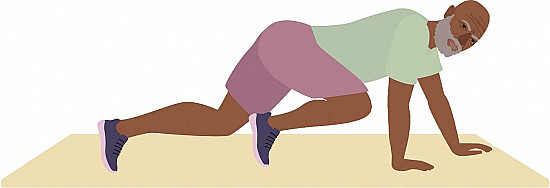Reviewing your wellness portfolio
Invest in your health to meet present and long-term goals.
- Reviewed by Howard E. LeWine, MD, Chief Medical Editor, Harvard Health Publishing; Editorial Advisory Board Member, Harvard Health Publishing

Financial planners recommend regular reviews of your investments to ensure they still meet your short- and long-term goals. You should take the same approach with your wellness. "A regular assessment of your overall well-being can help you stay on track and identify where you might need to make changes," says Dr. Shalender Bhasin, an endocrinologist with Harvard-affiliated Brigham and Women's Hospital.
Review process
As with a financial portfolio, a review of your wellness portfolio addresses three questions: where are you now, where do you want to go, and how will you get there?
Where are you now? Begin with a thorough assessment of your health. The goal is to record your usual habits and note recent changes. For example, have you experienced any pain in specific spots or discomfort doing certain activities or movements? Do you have less endurance or less energy? Have your sleeping habits or diet changed? What about your sex life? How many hours do you work out per week on average, and what kinds of exercises do you pursue? The more details you can provide, the better. "This examination can help reveal areas that might be underperforming," says Dr. Bhasin.
Where do you want to go? Next, list your goals. For example, do you want to travel, take up a new sport, or compete in a 5K race? Do you want to improve certain aspects of your health, like increasing your walking performance? Or do you want to maintain your current activity level or continue to live independently?
How will you get there? Once you have compiled this information, share it with your doctor. "By identifying where your health needs attention and what changes may be needed, you can work with your physician to draw up a strategy to address them," says Dr. Bhasin. Depending on your specific needs and goals, additional support could come from a certified trainer, physical therapist, or nutritionist.
Ongoing investments
Your wellness portfolio should also contain some standard ongoing investments, no matter your age or goals. "These areas promote long-term health, prevent injuries, and support daily active living," says Dr. Bhasin. Three worthy health investments men often don't make but should:
Strength training. Strength training helps counter the natural loss of muscle mass, called sarcopenia. After age 60, men can lose a quarter to a third of their muscle strength in their upper and lower body over a 10-year period. Consult a certified trainer who specializes in older clients to assess your muscle strength and help devise an adequate training plan.
Balance. Balance becomes increasingly important over time to help prevent falls. Every year, according to the CDC, one out of four adults ages 65 and older suffers a fall, and from 2007 to 2016, deaths related to falls increased by 30%. "Make sure you either practice regular balancing exercises or do yoga or tai chi to help improve and maintain your sense of balance, coordination, gait mechanics, and flexibility," says Dr. Bhasin. See your doctor if you have ongoing balance issues.
Attention to mental health. Depression or anxiety can become a problem at any age, but perhaps the biggest threat to older men's mental health is that many fail to recognize the symptoms of a problem. Speak with your doctor if you experience any of the following:
- loss of enjoyment in activities
- persistent sad or "empty" mood
- increased boredom and apathy
- fatigue or loss of energy
- restlessness or irritability
- insomnia or spending too much time in bed
- feelings of hopelessness or pessimism
- trouble concentrating or making decisions.
Your doctor may recommend a trial of medication or suggest talking to a mental health professional (in person or online). Devoting more time to a meditation practice and nature outings also can support your mental well-being.
Image: © Panuwat Dangsungnoen/Getty Images
About the Author

Matthew Solan, Executive Editor, Harvard Men's Health Watch
About the Reviewer

Howard E. LeWine, MD, Chief Medical Editor, Harvard Health Publishing; Editorial Advisory Board Member, Harvard Health Publishing
Disclaimer:
As a service to our readers, Harvard Health Publishing provides access to our library of archived content. Please note the date of last review or update on all articles.
No content on this site, regardless of date, should ever be used as a substitute for direct medical advice from your doctor or other qualified clinician.
















